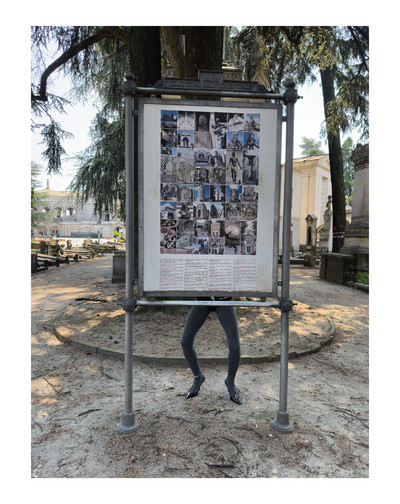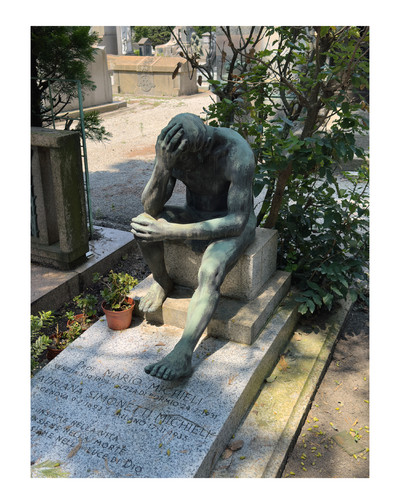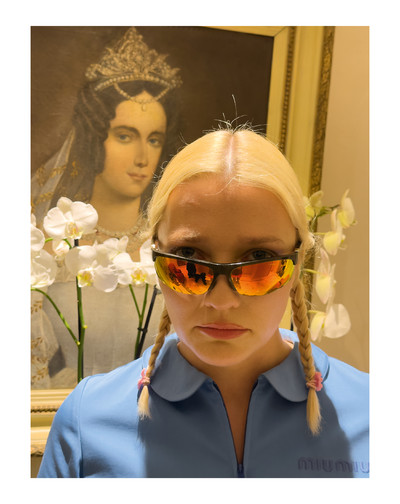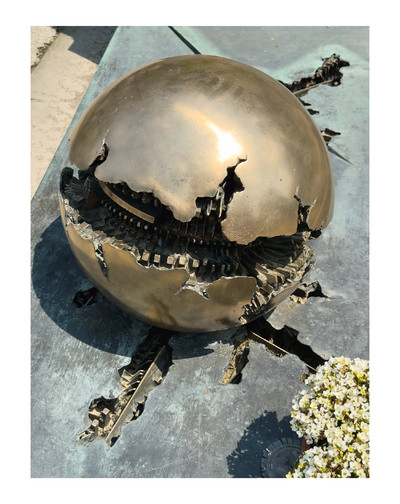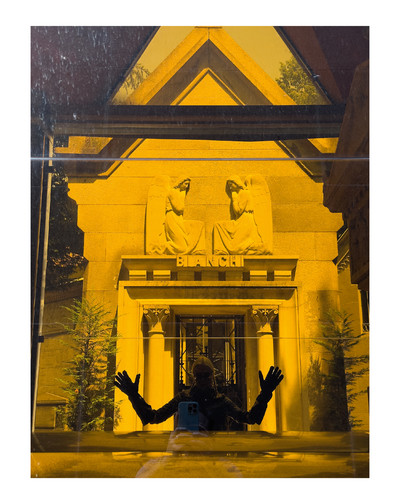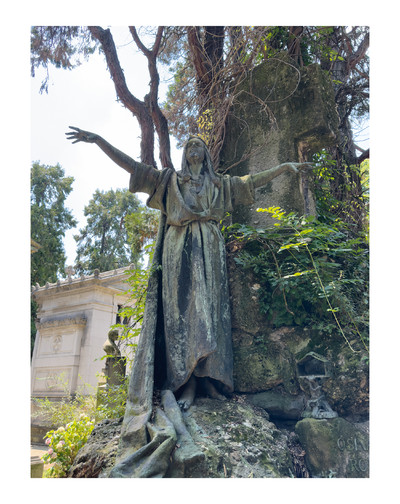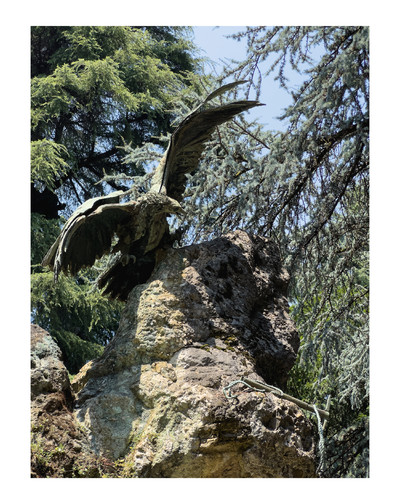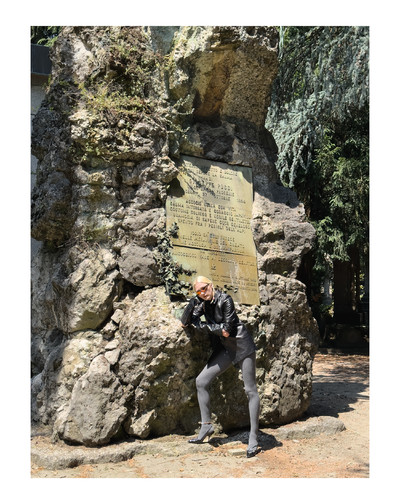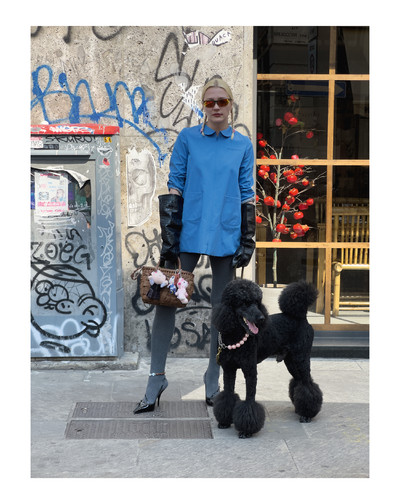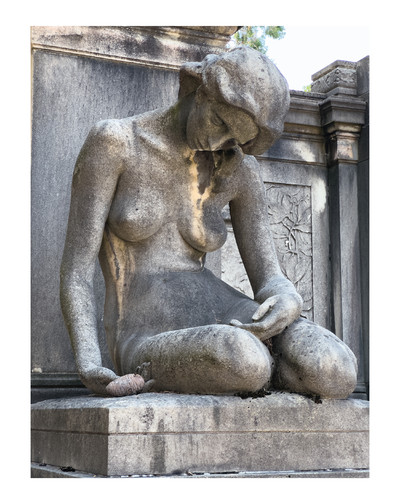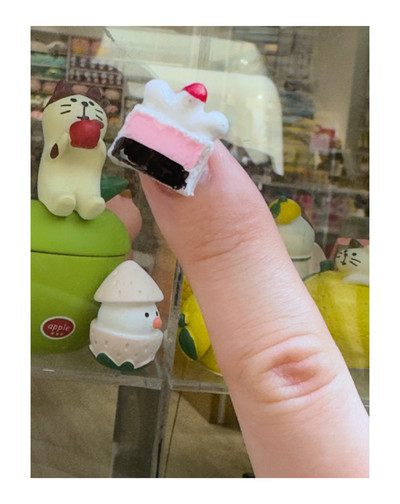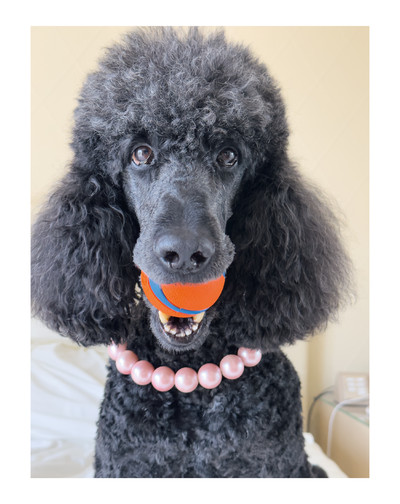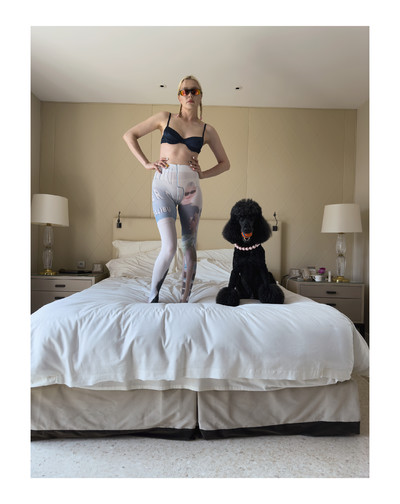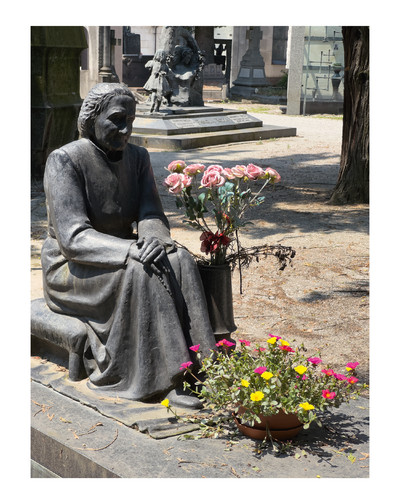Text by Alexander Fury
Photographs by Juergen Teller; creative partner Dovile Drizyte
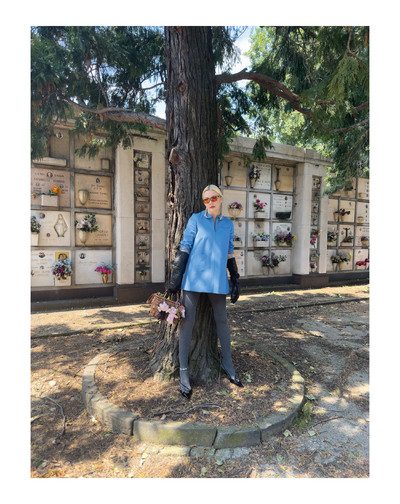
‘Lotta has a natural connection and understanding of fashion, and more importantly of contemporary culture. Another aspect that I admire is her curiosity and respect of individuals.’
It is understandably difficult to pin down Lotta Volkova. She works a lot, for many people, on many things: collaborating on fashion shows and advertising campaigns; consulting on collections, sometimes under her own name and sometimes those of others; and shooting editorial work that ends up in magazines and is occasionally bound into limited-edition books that become collectors-only art pieces. She is one of the most influential creatives working in fashion today.
‘Freelance stylist’ is the rather ironic ‘snippet’ (as it’s known) that comes up under the Google search result for her website. A site that is actually just a blank black page, no email, no nothing. Call my agent! It’s true, of course – she is indeed a freelance stylist – but it’s written with a blunt, matter-of-factness that makes her sound like a plumber. No job too big or too small. ‘I’m not really interested in the grand titles,’ Volkova says, when I ask her about it. ‘I’m not really interested in stardom, let’s say, and all of that attention. I’m actually interested in the work.’
We first meet in Milan, where she mostly works, then again in Paris, where three of the four shows she styled for the Spring/Summer 2025 season showed. Later, we speak on Zoom while she’s in Los Angeles, where she has lived for a couple of years with her partner Artem, an artist, and her six-and-a-half-year-old black giant standard poodle, Dimitri. When I Zoom into that location, I halfseriously expect Volkova to be #anked by a swimming pool, like that Terry O’Neill shot of Faye Dunaway and her Oscar, or Steven Meisel’s 2000 Versace campaign of glamorous kept women clad in furs in an over-furnished glamour pad. That shoot even had a poodle, but it’s white. I assume she’s living the (clichéd) dream.
Disappointingly, in real life, Volkova is in a plain white room in a West Hollywood apartment. ‘It’s a normal home,’ she says. ‘Well, kind of. It has a lot of art objects, I guess, so people say it looks a bit more like a gallery rather than a living space. I’m not so into very comfortable chairs.’ More a Donald Judd vibe? Volkova cackles. ‘Voila, you’ve got me. In the choice between looks and comfort, it’s leaning towards looks, unfortunately – or fortunately. I like it.’ Her Zoom room is sparsely decorated with a pinned-up spread from 0081, her recently published book with photographer Moni Haworth, featuring images of lavish, largely gelatinous Japanese desserts. She’s wearing a white “cotton poplin dress by Miu Miu, the brand for which she has notably worked since 2020. Collaborating closely with Miuccia Prada, she consults across the collections, and styles all advertising imagery and fashion shows.
Yet styling feels like an understatement of what Volkova actually does, which includes practising what she preaches and wearing some of Miu Miu’s most extreme looks. Like an underwear-as-outerwear ensemble of sequinned panties over sheer tights and under nothing, topped by a demure turtleneck sweater. Emma Corrin modelled a version in Miu Miu’s Autumn/ Winter 2023 show, and Volkova wore it to the brand’s post-show dinner the next season. Indeed, throughout her career, Volkova has embedded herself with designers, consciously limiting herself to only working intensely with a handful. ‘That’s just my nature. I know I’m not necessarily also always expected to, but I feel like if I engage on a project with someone, if I make that decision to engage with something, I really engage fully and I give all of myself,’ she says, cautiously. ‘Which is not always a good thing.’ This past season, she worked with Maximilian Davis at Ferragamo, with young designers Benjamin Barron and Bror August Vestbø, who design for a label named ALL–IN and show once a year, and Ellen Hodakova Larsson, winner of the 2024 LVMH Prize.
Volkova’s first work with Miu Miu was on the Autumn/Winter 2021 show, presented on digital video due to Covid- 19 restrictions in March 2021. In it, models wandered through snow in the Dolomites wearing brightly coloured puffer jackets and crochet. It was inspired, in part, by Miuccia Prada’s recollections of skiing in a bikini as a young woman. At one point, Volkova tells me she has a passion for ‘extremes – for example, black leather next to something very pink, baby girl or very fragile, feminine.’ Or a bikini worn, up a mountain, in three feet of snow. I can see why they get along.
It was the next season, however, where Miuccia Prada and Volkova’s work together on Miu Miu really hit pay dirt: that collection needs little introduction, other than saying it was the season of ‘The Skirt’. A pair of chino trousers chopped down into a micromini, pocket-bags dangling past the hem, worn with similarly sliced-up, ‘I remember my dad bringing back a Tina Turner tape, and Western fashions – denim and nylon stockings were a rarity in the Soviet Union.’ midriff-baring sweater and shirt, the look proved meme virality in sartorial form, representative of a collection whose leitmotif was everyday garments reconfigured, spliced, diced, and reproportioned to seem brave and new. The outfit sold out, and then sold out again (I managed to buy one in Venice). It featured on magazine covers, was selected as ‘Dress of the Year’ at the Fashion Museum, Bath, and even spawned costume imitations at Halloween. The next season, Miu Miu explored a similar notion – because the idea of revisiting a radical idea itself seemed pretty radical in a world obsessed with the new and the next. Plus, if it ain’t broke, don’t “x it. And on and on. Season after season, Miuccia Prada and Volkova have collaborated to everincreasing critical and commercial success. As of the third quarter of 2024, Miu Miu sales were up 97% year on year. The work is working, and what’s rewarding about that, for fashion people, is that Miu Miu clothes are great. It’s not the case of sales spiking around anodyne, predictable product or savvy marketing; Miu Miu is embedded with the identity of Miuccia Prada, her intelligence, wit and personality. Which is also something Volkova has admired, forever. ‘It’s funny because I’ve always been the biggest fan of Prada and Miu Miu,’ she says, earnestly. ‘They were honestly, really, the only shows that I would watch live online, even if I was working with another client that day. Like, “Oh my god, what is this going to be this time?”’ It’s one of the most endearing things about Volkova – she’s a true fan of fashion.
‘I remember my dad bringing back a Tina Turner tape, and Western fashions – denim and nylonstockings were a rarity in the Soviet Union.’
Like her, I’m actually interested in the work. Miuccia Prada once told me that the Miu Miu show essentially is designed in the 12 days between the Prada show in Milan and its unveiling in Paris. (Well, actually, I asked her if that was true, and she nodded.) I ask Volkova how that is, how it’s possible, and how it feels to work that way.
Lotta Volkova: We have meetings throughout the season, but it defnitely gets pretty heated in the last two weeks, and indeed after the Prada show. Of course, we do have a direction from the start; we do launch samples, we do talk about what we are doing. Everything always starts with a look, but it is during those last two weeks that we have really the de”ning crucial moments when it solidifies but a lot can still change. A lot is left to that freedom of questioning: ‘Does this still feel relevant or do we do something else?’ I do think it’s important to be open to that question. OK, you suddenly have an unexpected great idea and you’re like, ‘Oh my god, this is going to put everything upside down on its head’, but it’s worth it. Being ready to go through with that – that’s important, and that’s when great things happen.
Alexander Fury: Is there anything in particular you can think of, like that?
Having said that, we haven’t really changed ever our minds fully, never. It hasn’t happened while I have been working with Miu Miu.
You’ve never ditched a collection?
No, we can still be discussing lengths and finalizing details, sometimes designing dresses, embroidery, and print. But the direction is pretty much set with the first idea, the first look, the first, I don’t know, reference photograph. It always stays until the end somehow. It’s more about making it precise, perfecting it. One thing I’ve definitely learned from Mrs Prada and working with Miu Miu is the notion that less is more. You can say that in many different ways, but I feel like I had never really seen it come to life so precisely before working with Mrs Prada. Being very precise, very focused, and analysing why you have that detail, analysing what it means to have that – I don’t know – that cardigan, what it means to have this length of skirt. Why is it this length? It’s never really random with her; it’s always very, I could say intellectualized, but there’s always a reason.
Considered.
It’s also more than an instinct; it’s a very studied, precise idea of a character, a personality. Why would this person wear that exact skirt with that particular jacket, what makes their hair messed up, why are there certain items in their bag, where are they going looking that way? Each collection is very precise to that look. It’s almost like creating a movie scene. I feel like it’s my job to help make it come through in the clearest manner.
‘I’m not really interested in the grand titles. I’m not really interested in stardom, let’s say, and all of that attention. I’m actually interested in the work.’
Does Mrs Prada surprise you?
Yes, absolutely. It really is Mrs Prada’s nature to suddenly say, ‘What about that?’ And you think, ‘Oh my God, I never thought you would be into that. I never thought we would be working with that.’ Also, we understand that it’s important to be open to changing our minds. We stick to a plan, but then Mrs Prada will always be open to changing if it suddenly feels right. Six months before or a week before, an idea might not be relevant at all, but suddenly it feels just right and makes sense. Like that you’re almost tuned into the moment, and I feel like that’s really important. It’s something that she’s very sensitive to and very in tune with. She feels that spirit of our times, and what is right in that exact moment. [She pauses.] Mrs Prada, she thinks. She has a point of view. Most designers don’t try to say anything. They’d rather not say anything at all. For them, they’re just making clothes that are nice, and it’s enough. They’re satisfied.’
Lotta Volkova is Russian, and even when speaking English has a directness that many have commented on as a characteristic of her native language. It’s not rude, at all, but there’s certainly no bullshit. It’s refreshing. She is an Aquarius, if you hold truck with those things (‘independent, free-spirited and eccentric’), and was born in 1984 in Vladivostok, on the far-flung, eastern reaches of the-then USSR.
For context, Vladivostok is roughly 50 kilometres from the Chinese border and 130 kilometres from North Korea, but it’s a 10-hour flight to Moscow. Volkova was isolated: ‘If I had been a teenager in Moscow, I would have been way more exposed to the creative industries. I would have managed to sneak into a club, but there wasn’t anything like that in Vladivostok.’ The city is at the far end of the Trans-Siberian Express, which sounds romantic and, stereotypically, makes you (or rather, me) think either of the babushkas and onion domes of old Russia or of the worn Brutalist concrete and thick snowdrifts of Soviet times. But she asserts it was actually pretty idyllic. ‘I spent a lot of time on the beach,’ Volkova says. ‘We have surfing and windsurfing; we go hiking and up to the mountains, which have beautiful scenic views over the ocean.’ She sounds like she works for the Vladivostok tourism board. ‘While I was growing up in the middle of it, I used to hate it,’ she continues, laughing. ‘I used to really not enjoy nature; I was so bored. Painfully bored. I remember this boredom. I just couldn’t wait to get out of it and go to London – an epicentre of culture I was obsessed with.’ It was a toss-up between London and Los Angeles: ‘I’d completely forgotten about it, but one of my best friends who I’ve known for a very, very long time reminded me that I’ve always wanted to live in LA. I was faced with a choice – either go to London or Los Angeles because I’m from Vladivostok, which is kind of the middle.’
The city is maritime. It is the home of the Russian Navy’s Paci”c Fleet and Volkova’s father was a captain on cargo ships. Although he travelled incessantly, it meant her family had access to the otherwise inaccessible. ‘My father used to sail frequently to Japan, Korea, Thailand, Germany, the US,’ Volkova recalls. ‘He actually managed to travel all over the world back in the time when we had the Iron Curtain and it was really difficult to travel outside of the Soviet Union. So in that sense we grew up in quite a privileged way. Being exposed to the “little treasures” from foreign cultures, like music tapes, VHS. I particularly remember him bringing back a Tina Turner tape, the latest Western fashions – denim and nylon stockings were a rarity in the Soviet Union – and Japanese sweets. I remember eating boxes of Choco Pie.’ He also brought her Japanese fashion magazines, which Volkova couldn’t read but whose imagery fascinated her.
On the maternal side: doctors. Volkova’s mother taught physics at a medical school; her grandmother was a surgeon. Her aunt is a midwife and her uncle was a coroner. ‘My family could take care of you from the beginning until the end, from birth to death – we had it all covered,’ she says, smiling. ‘My dad and me would drive to my mum’s med school to pick her up from work and while we waited for her, we’d wander around the university grounds, getting lost in corridors “lled with museum displays of various anatomical preparations, jarred examples of diseased tissues, bones, and anatomical sketches. I was always obsessed with them.’
‘It really is Mrs Prada’s nature to suddenly say,‘What about that?’ And you think, ‘Oh my God,I never thought you would be into that.’’
Obsession is something Volkova experienced early. Her family got access to the internet when she was nine. ‘The less there is around you, the more stimulated, the more obsessed you get searching for something that’s impossible to “nd,’ she says. ‘So that has always been my driving force. I learned a lot about fashion, about art, about music. I would stay up nights listening to live shows on Internet radio stations like [hard-rock] KNAC.com or to an Ozzy Osbourne interview, or ‘It really is Mrs Prada’s nature to suddenly say, ‘What about that?’ And you think, ‘Oh my God, I never thought you would be into that.’’ seeking out the freshest photos of the latest fashion shows on “rstview.com. That’s how I learned English.’
Her mother gave up work in 1991, when Volkova was six, and it was through her that she was exposed to fashion. ‘Back in the 1990s there were no brand stores in Vladivostok,’ Volkova recalls, ‘but a few risk-taking female entrepreneurs used to rent suites in big hotels in the city centre and sell a multibrand selection of items, which they’d purchased in stores abroad. Of course, these “shops” were pretty illegal, secret businesses, so you could only learn about them through contacts. My mother was lucky enough to discover a few. I still remember those trips.’ Her mother also wore McQueen and Westwood and she remembers printed Prada suits and Versace vinyl skirts, marked up way past their retail price. It was her mother, too, who spotted Volkova’s creativity and encouraged it: rather than following the family into medicine, she suggested her daughter study art after she spotted Volkova’s teenage drawings – portraits of her heroes, ‘Iggy Pop or Blackie Lawless from W.A.S.P.’ She moved to London aged 17: ‘I graduated in June and the day after I was on a plane to London, alone.’
Volkova spent six and a half years in London, studying fine art and photography at Central Saint Martins, which, perhaps, in part explains her interest in image-making through clothes. She arrived in 2001, a period when London’s nightlife was #ourishing. She reinvented herself as Lotta Skeletrix, with hair and make-up in#uenced by the London punk scene; she was photographed by Wolfgang Tillmans with a glitter ball on her head at Kashpoint, a club she helped co-host. She began a #edgling fashion label at the encouragement of stylist Nicola Formichetti. Acting as a buyer, he purchased her clothes for the boutiques the Pineal Eye in London and Side by Side in Japan. ‘I fell into designing by accident,’ Volkova says. ‘I wasn’t really planning on becoming a fashion designer. It’s something that happened to me in London, for a moment.’ She staged a couple of shows, to acclaim. The clothes are very different to Volkova’s look now: ‘I was customizing garments to go out to clubs, but it was very basic in a way. I used to get vintage jeans and rip them up by hand using sandpaper, then add studs all over them. I was also customizing deadstock military T-shirts by studding them or sewing on leather straps. It was just me and my friends making everything, having a couple of beers after school… It was very DIY; it was not professional.’
It was, however, very much Volkova’s personal style at that time, which is what people found compelling, and wanted to buy into. The whole reason she began styling, she readily admits, is because the photographer Ellen von Unwerth loved the way Volkova looked – as many people did, and still do – and asked her to style a shoot just like her. ‘I’ve always loved Ellen’s work,’ Volkova says. ‘I love its energy, spontaneity and femininity – the explosive femininity of her photographs.’ She moved to Paris in 2008, and found it impossible to continue to design: ‘It was very expensive to produce, to find ateliers to work with you. Because of course, Paris is the capital of fashion and every single person is aspiring to work for a big house or already working for a big house. So I didn’t really find that much support or opportunity for myself.’ She stops. ‘I had to basically restart from zero and it took some time for me to really figure it out. It was a tricky time.’ She decided to style, working on her first stories with von Unwerth. She never stopped.
Volkova’s style, however, has never been static. I’ve known her for a little under a decade, during which time it has evolved, I think softened; her hair is long and bleached-blonde now, rather than dark and hacked short, as it was a decade ago. We meet at a pasticceria at the height of the Milan summer, and she has playful Sylvanian Familysized donuts glued to her pink acrylic nails. ‘I grew up obsessed by so many different designers for different reasons. I enjoyed the chic minimalism of Prada, the ultra-sexy Tom Fordera Gucci, the eccentricity of Alexander McQueen, and the punk-rock attitude of Vivienne Westwood,’ Volkova remembers. ‘Now, I really enjoy working with designers who are very different to each other and represent different ideas and styles. For example, when I worked with Nicola Brognano for Blumarine, we established a really different look to the other brands I had worked with. So I guess it excites me to work in such varied ways, with a completely different aesthetic.’
‘Most designers don’t try to say anything. They justwant to make nice clothes and it’s enough for them.Mrs Prada, she thinks. She has a point of view.’
This is something notable about Volkova’s style: it’s both distinct and instantly recognizable, yet transmutable, ever-changing and – importantly – ‘Most designers don’t try to say anything. They just want to make nice clothes and it’s enough for them. Mrs Prada, she thinks. She has a point of view.’
Lotta Volkova keyed into the designers with whom she is working or into a fashion show. ‘When I go into a house and work with a designer, my job is really to bring out what’s the strongest in them, the best about a particular collection and how we can make it the strongest it can possibly be,’ Volkova says. ‘Make the message as clear as it can be – that’s the angle I’m coming from. It’s never really about my taste even. Of course, my taste does come through, because I’m doing it from my perspective, but I’m never trying to push my agenda through. It’s always about collaboration with a designer and their point of view and how we can intensify that.’
That’s different to many stylists who are recruited to bring a specific ‘look’ to a particular house – or, indeed, when a stylist has a particular stylistic obsession in any given season, and crops of models will appear across different fashion capitals with identikit haircuts, similar shoes, and maybe a weirdly tied bow to mark ownership. Volkova asserts she isn’t into that kind of power play.
‘For me, power is the wrong word,’ Volkova says. ‘It’s something quite negative. It’s not about power, it’s about a process of working together in collaboration, rather than someone being more powerful than the other element. I know my place as a stylist; I know my job. If I wanted to design a collection by myself, I would do it, or I’d do a collaboration under my own name. I don’t have that frustration; I’m not looking for that power or title.’
Editorial is something she approaches differently, though. With designers, she’s working for them, but editorial is personal. ‘It’s more like creating a picture, an image, a mood, a story,’ she says. ‘Almost like a little movie of what happens from the first photo until the last photo.’ Volkova says she likes America because it’s ‘cinematic’, a word she also uses to describe the evolution of her work: ‘My journey of shooting editorial has evolved in a more cinematic and more complicated way. It has turned into something more complex.’ (I ask if she’s ever consider costuming a “lm: ‘People ask me about it; that could be an interesting development one day, but I don’t know.’) Back to editorial: ‘I’m never really interested in what bag I’m going to put with what out”t…’ She pauses. ‘At least I don’t look at it from a perspective of fashion. I’m not interested in shooting fashion, really.’
Are you going to say you’re not excited by fashion?
I want to say I don’t look that much at fashion, but that’s not really true, because I do. I have to look at it, I have to look at it all the time when I’m pulling for editorials and I’m really happy looking at every single show. When I’m working on a shoot, my assistant does requests, but I do all the selections of the looks myself. I’ll go and look at every show in the season. It’s also very important that I don’t outsource that to an assistant, but personally look at every single show and “nd what feels right. I do enjoy it; it’s a part of the process. Sometimes it’s a lot of information, but a really important part of my job is to be aware and to see and choose what’s right politically, visually, conceptually.
That said, I’ve spoken with three different, very high-profile stylists, who all say, ‘I’m not really buying clothes.’
Oh, I’m buying clothes.
What are you buying, besides Miu Miu? Although maybe you don’t have to ‘buy’ Miu Miu?
I’m buying a lot – and I’m buying Miu Miu because I’m so over my allowance that I am actually buying it. I’ll buy Prada, Phoebe, Saint Laurent, Loewe, Junya. Also, young designers: I wear ALL–IN a lot, also Hodakova. I got a pair of jeans with inserted swimming trunks from Duran Lantink that I love; there’s also Jenny Fax, Ans Dotsloevner, Glumkimberly. That’s about it, but I’m also open to the unexpected. If I really love something, I don’t really care if it’s considered cool or not.
‘I want to say I don’t look that much at fashion, butthat’s not really true, because I do. I have to lookat it, I’m really happy looking at every single show.’
That sounds like an odd assertion from someone whose stock in trade has been that dif”cult-to-translate notion of cool. ‘How Lotta Volkova Became the Coolest Stylist in the Industry’ read the hyperbolic headline that ran with a pro- “le of Volkova in the May 2016 issue of W. ‘In an industry that constantly seeks to label things “cool”, Lotta Volkova has just been crowned as the coolest woman in the world,’ was the choice sentence closing the “rst paragraph of a pro”le in the normally level-headed British newspaper the Guardian the same year. (‘That one’s psychotic,’ Volkova says, laughing.)
Both of those profiles came about during Volkova’s time working for Demna, when he still headed the brand Vetements – which he founded in 2014 and which Volkova styled from its second season and first show – and had just been appointed creative director of Balenciaga.
In 2016, she was both right-hand woman and close friend to Demna. (Volkova ceased her collaboration with both labels in 2017.) She was also working with Russian designer Gosha Rubchinskiy to style his ownlabel shows (Rubchinskiy is now head of design of YZY, Kanye West’s fashion brand). She was perceived, to a degree, to be an embodiment of the ‘Vetemenciaga’ woman, so much so that she modelled in shows for both brands.
I interviewed Demna for T, the New York Times’ style magazine, that same explosive year and he told me: ‘When I work with Lotta – she knows what I know, what I want. We’re very close, we really know each other, we’re friends. It’s not like I hired her.’ ‘We’re very close – we’re close in general – but in the way we think,’ Volkova told me for another profile of her that ran in W in August 2016. ‘We have the same references, we come from a similar background. We’re on the same page, in what we want.’ My pro”le ran with a portrait of Volkova by Juergen Teller, under the headline, ‘How Did Lotta Volkova Become the Fashion Arbiter of Her Generation?’
Volkova views this part of her personal and professional past philosophically. ‘What was really special about that time was that I had been styling, working in the industry for a while,’ she re#ects. ‘I feel like my style hadn’t really changed then, it had always been the same. I’ve always been inspired by more or less similar worlds. What really changed was that, finally, the designers I met at that time – like Demna – were coming from a similar culture. We shared the same references and interests, in music, art, visual culture. Suddenly we were in tune all together, talking and working. It was fun and it was exciting, and the creativity exploded in that way: all working together towards something we believed. We lived it as well, wore it, believed in it. So that’s when the rest of the world tuned in and started to listen.’ That was important, because Volkova has always felt like an outsider in fashion. In a sense, she continues to be – decamping from Paris after 17 and a half years to Los Angeles, she is wilfully placing herself outside of the conventional fashion system.
‘Living in LA I find very therapeutic, even though I do fly all the time and even though the jet lag is pretty physically exhausting,’ she says. ‘We do occasionally shoot campaigns in LA due to the proximity of Hollywood and I do love shooting editorials on locations around LA.’ Still, she admits, ‘Every time I land, it feels like I’m on holiday.’
It’s December and I’m talking to Volkova, who is in LA, on Zoom. ‘I think,’ she says, ‘coming back to where we left off last time, talking about being an outsider, is important.’ I assume she means geographically, but, ‘what I meant more was also in terms of upbringing and not being from a European background, not necessarily sharing the same codes, of social classes.’
How important do you think growing up in Russia was and has been?
I do think everyone’s upbringing somehow influences patterns of thinking. Growing up in a place that was so far away from everywhere, that really literally felt like the end of the world, built certain character traits in me. This endless search, quest for something – I think that definitely formed because I grew up in Vladivostok. Also, not being a part of European society… I feel like an outsider, who is looking in, trying to learn and observe all these codes and rules, and sometimes I “nd it fun to fuck up those stereotypes. They don’t mean that much to me because I come from such a different background.
Also, you grew up in a very different environment to the people around you now. You said, even after the fall of Communism, there was difficulty in getting everyday things – what I consider to be normal things – like fashion magazines.
Coca-Cola. We didn’t have Coca-Cola. But having access to something doesn’t mean that you have the culture of it. Because you didn’t grow up with it, you don’t necessarily grasp the true meaning. So for me, the 1990s were really quite an interesting, chaotic time, anarchy really, because it was about discovering everything for the first time. I was quite young, I was really a child, observing all of that, but for my brother’s generation, 16 years older than me, for them it was a very different, sometimes tragic experience, suddenly embracing nightclubs, music, and drug culture. It’s not just about growing up in Russia, it’s also about growing up at that point of time in the middle of a very special political situation. So far away from Europe, so far away from everywhere, really. And being exposed to all of this, all at the same time. Suddenly the excitement of the first-time discovery, that for sure is definitely reflected on me.
‘I feel like an outsider, who is looking in, trying tolearn and observe all these codes and rules, andsometimes I find it fun to fuck up those stereotypes.’
What is interesting about Volkova is that she has created her reputation on her own terms. She has fans, although that’s my terminology, not hers: ‘I don’t look at them as some kind of fans. It’s more like we share the same interests and obsessions.’ They follow her on Instagram – which she describes as being like her diary – and when she recently held two Tokyo book signings for her project with Moni Haworth, there was an hourlong to have copies signed.
Volkova doesn’t like the word power, but she has it – her work resonates, especially with her own generation and younger. It’s something she’s always been able to do, it seems, and it’s all the more remarkable because Volkova has largely avoided working with conventional mainstream titles, whose large circulations are still seen as an efficient means to convey your message to the widest audience. ‘That’s something I’ve never been interested in – the mainstream,’ Volkova says. ‘As soon as something is mainstream and everybody knows about it and likes it, it turns me off.’ I wonder if she’s interested in magazines at all; she is, but still. ‘I don’t really like to be stuck in this very rigid system,’ she says. ‘I want to do more surprising stories, and I feel like that is pretty much impossible when you work for more institutional, bigger- title magazines, because you have so many rules.’ She frowns. ‘I’ve always wanted to do a one-image or a one-look fashion story, for example. That hasn’t quite happened yet because of, you can imagine, an extensive list of advertisers.’ She smiles.
Volkova’s editorial work is as varied as her fashion work. There is, however, a thread for her. ‘I have always been attracted to the beauty of imperfections and gestures,’ she says. ‘Something that happened that wasn’t meant to happen.’ Many of Volkova’s images seem captured from the wrong angle, models contorted unusually or models don’t look like models wearing clothes that don’t look like fashion. Yet they remain compelling, arresting – and also often singular. ‘Once you’ve posted that image – these days, people aren’t even really excited to see the rest of the shoot,’ she says. ‘Once they’ve seen one image, they know the gist; the rest of it doesn’t really get that much attention, but that doesn’t really bother me.’ Maybe her one-image fashion story makes more sense than she thinks.
It would benefit us to listen, anyway, because the thing Volkova has become known for – valued for, paid for – is being able to sense a shift in the fashion pulse. It’s difficult to write about without sounding naff, without using cringeworthy terms like ‘zeitgeist’ or ‘disruption’. It’s also difficult to pin down exactly what it is that Volkova can do, but, essentially, she knows what feels right, in any given moment, and can create images with meaning.
‘Whenever I do personally get really excited about something, a lot of the time that resonates with the rest of the industry, other people, the audience,’ Volkova says, carefully. ‘These days, we are so overexposed to images, bombarded with references. The attention span is pretty short. Whenever we do get really excited about something, or encounter something that makes us look at it twice, that’s when you know that moment is important or makes sense.’ She pauses. ‘I wouldn’t say I know what’s right or wrong. It’s about trying to stay as free as you can within the limitations and rules that you have. To manage to push it and get inspired and excited yourself about what you’re managing to achieve with a certain collection or a certain photograph, it’s down to that.’
Which is a magical ability to have.
